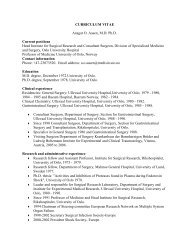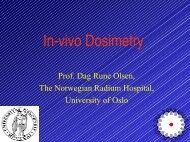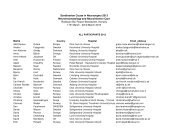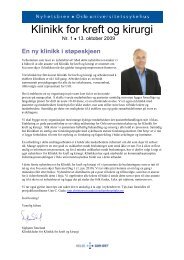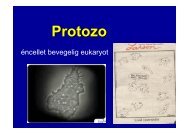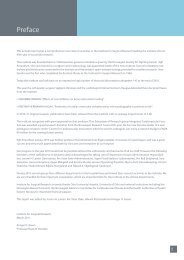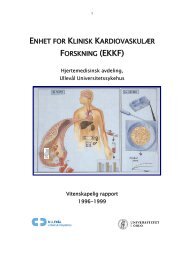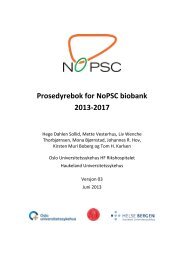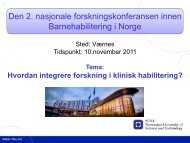Novel genetic and epigenetic alterations in ... - Ous-research.no
Novel genetic and epigenetic alterations in ... - Ous-research.no
Novel genetic and epigenetic alterations in ... - Ous-research.no
You also want an ePaper? Increase the reach of your titles
YUMPU automatically turns print PDFs into web optimized ePapers that Google loves.
CONCLUSIONSWe have identified <strong>no</strong>vel epi<strong>genetic</strong> changes <strong>in</strong> colorectal tumors <strong>and</strong> some are considered aspromis<strong>in</strong>g diag<strong>no</strong>stic biomarkers. Hypermethylation of ADAMTS1, MGMT <strong>and</strong> especiallyMAL are frequently seen <strong>in</strong> precursor lesions as well as carc<strong>in</strong>omas regardless of MSI-status,<strong>and</strong> rarely <strong>in</strong> <strong>no</strong>rmal mucosa, mak<strong>in</strong>g them suitable for early detection. In addition,hypermethylation of CRABP1, MLH1, NR3C1, RUNX3 <strong>and</strong> SCGB3A1 were seen almostexclusively among MSI-carc<strong>in</strong>omas, mak<strong>in</strong>g them suitable as identifiers of these tumors.Overall, the augmented methylation frequencies from <strong>no</strong>rmal mucosa, via ade<strong>no</strong>mas tocarc<strong>in</strong>omas suggest that epi<strong>genetic</strong> biomarkers may be used for cancer risk assessment.For the first time we showed that NF1, a negative regulator of KRAS, may be <strong>in</strong>volved <strong>in</strong>colorectal cancer. Through mutation <strong>and</strong> copy-number analyses we found that more than40% of the colorectal carc<strong>in</strong>omas had mutations <strong>in</strong> the NF1 gene, which might causealternative splic<strong>in</strong>g or wrong prote<strong>in</strong> fold<strong>in</strong>g. However, further studies are necessary to verifyany potential functional consequence.Includ<strong>in</strong>g the NF1 data we show that <strong>alterations</strong> <strong>in</strong> one or more of the KRAS, BRAF, NF1<strong>and</strong> RASSF1A genes are found <strong>in</strong> 74% of the analyzed carc<strong>in</strong>omas, underl<strong>in</strong><strong>in</strong>g theimportance of the MAPK pathway <strong>in</strong> colorectal cancerThe mutation status of one gene, RCC2, among 41 genes analyzed was shown to carryprog<strong>no</strong>stic <strong>in</strong>formation among patients with MSI tumors. Mutation of RCC2 was associatedwith good prog<strong>no</strong>sis, even with the <strong>in</strong>clusion of tumor stage <strong>in</strong> multivariate regressionanalysis. RCC2 as a prog<strong>no</strong>stic marker was identified <strong>in</strong> a cl<strong>in</strong>ical test series <strong>and</strong> confirmed <strong>in</strong>an unselected prospective series.64





